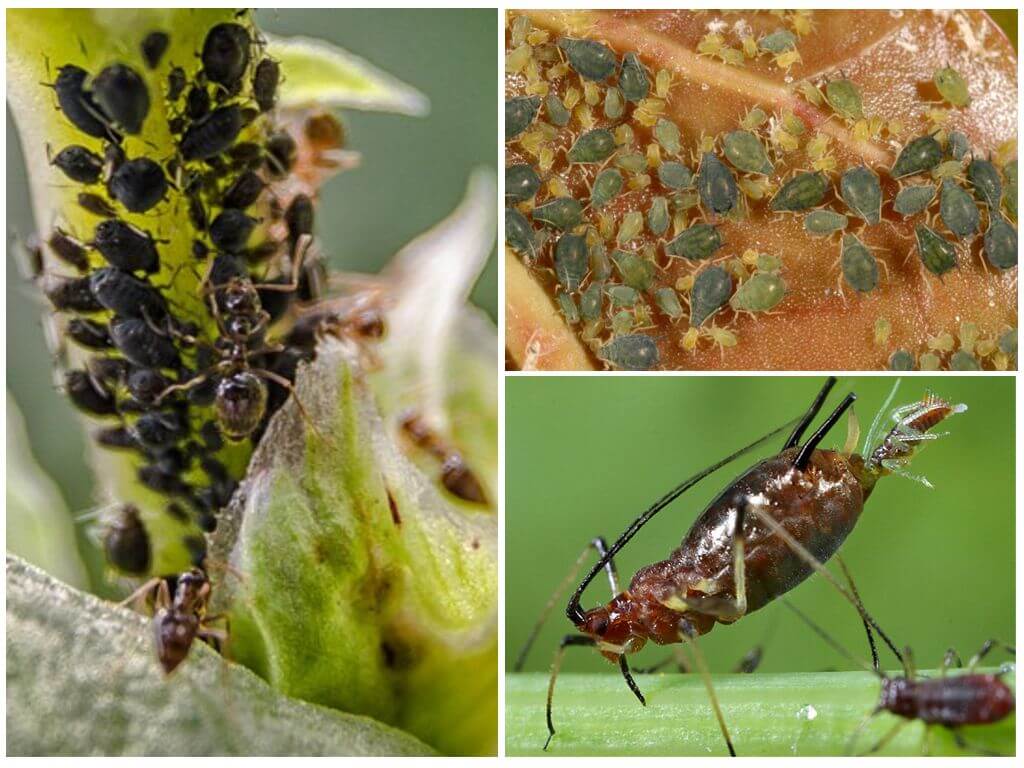How does aphid appear on plants
Aphids often plague gardeners and gardeners. She sucks the juice from the leaves and thereby destroys the landing. The pest does not start only on the plots. He attacks and home flowers. To effectively deal with it, you should know where the aphid comes from on plants.
How aphid appears on sites
Many are faced with the "invader" in the suburban areas and in the gardens. Warm weather sets in as young leaves and shoots on trees and plantings are attacked. aphids. It seems that it appears out of nowhere.
But infection occurs in two ways:
- It is carried different types of ants.
- New individuals hatch from eggs hibernating in tree trunks.
In the cold season, the ants carry the aphids and its eggs from the plants into their nest so that it does not die from frost and icy wind. With the onset of warm days, foragers plant their "pets" on young leaves and begin to graze, jealously guarding the "food base" from the ladybirds. Aphid can appear on any plants and saplings.
Interesting!
Little toilers eat padja - skoky allocated plant lice. They tickle the belly of the aphids with the antennae, and she gives them a drop of sweet drink.
If there are too many insatiable pests on a tree or shrub, then working ants will start spreading them to other fruit crops and weeds. So thanks to the efforts of the garden species there is a plant louse.
But the insect is able to independently take care of the continuation of its kind. Females that reproduce new offspring hatch from eggs. In the middle of summer winged females and males are shown from the regular clutch. They fly over to other plants and lay eggs in the bark of trees and shrubs that must survive the winter.
With the onset of heat from the clutch, new individuals are shown. The cycle is repeated again.
The most affected by the aphid invasion are:
- fruit trees (including Apple tree, pear, plum and cherry);
- roses;
- currant;
- cucumbers;
- tomatoes;
- pepper;
- cabbage;
- viburnum;
- dill;
- raspberries.
How does aphid appear on home flowers
Pests manage to spread by indoor plants. This happens in the warm season, when the flower growers send their “pets” to the balcony - and winged individuals attack them.
On a note!
Aphids are not able to soar high. Therefore, residents of the first and second floors are more likely to encounter insects. Sometimes the parasite is assisted by the wind. He picks it up and carries it over to the other leaves.
But this is not the only way pests enter the apartment. Formed by aphids in the following ways:
- flies through open windows and doors;
- brought by people on their clothes and shoes;
- enters the house with other plants, bouquets of flowers.
All purchased pot flowers are processed store chemicals or homemade infusions and kept for 2-3 weeks in quarantine, and bouquets of wild flowers collected in a field or forest are placed away from indoor plants.
Aphids multiply rapidly and spread throughout the plants. With weeds, it crawls on trees, bushes and fruit crops. Foragers often help her in this.To protect the garden, you need to fight not only aphids, but also anthills.





